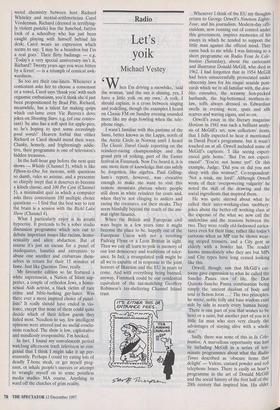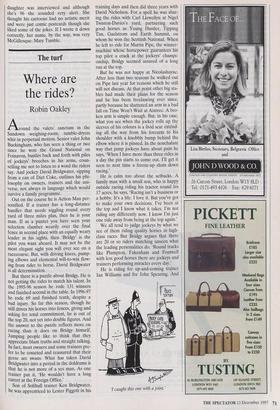Radio
Let's yoik
Michael Vestey
When I'm driving a snowbike,' said the woman, 'and the sun is shining, yes, I have a little yoik on my own.' A yoik, I should explain, is a cross between singing and yodelling, though the examples I heard on Classic FM on Sunday evening sounded more like my dogs howling when the tele- phone rings.
I wasn't familiar with this pastime of the Sami, better known as the Lapps, north of the Arctic Circle in Norway until I heard The Classic Travel Guide reporting on the reindeer-racing championships and the grand prix of yoiking, part of the Easter festival in Finnmark. Now I've heard it, it is one more item of knowledge that can safely be forgotten, like algebra. Paul Gilling- ham's report, however, was evocative enough to make me want to visit this remote mountain plateau where people still dress in white reindeer fur coats and, when they're not clinging to antlers and racing the creatures, eat their steaks. They seem blissfully beyond the reach of the ani- mal rights fanatics.
When the British and European civil wars begin in a few years time it might become the place to be, happily out of the European Union with not a revolting Padraig Flynn or a Leon Brittan in sight. Then we can all learn to yoik in memory of our lost democracy and traditions of toler- ance. In fact, a strangulated yoik might be all we're capable of in response to the joint horrors of Blairism and the EU in years to come. And with everything being banned, anyway, Finnmark could be our residential equivalent of the tax-snatching Geoffrey Robinson's tax-sheltering Channel Island trust. Whenever I think of the EU my thoughts return to George Orwell's Nineteen Eighty- Four, and his journalism. Modern-day offi- cialdom, now running out of control under this government, inspires memories of his essays in which he tended to support the little man against the official mind. They came back to me while I was listening to a short programme on Radio Four In Cele- bration (Saturday), about the cartoonist and illustrator Donald McGill, who died in 1962. I had forgotten that in 1954 McGill had been unsuccessfully prosecuted under obscenity laws for his risque seaside post- cards which we're all familiar with, the dou- bles entendres, the scrawny hen-pecked husbands, the big-bottomed mothers-in- law, toffs always dressed as Edwardian swells in evening wear, spats and silk scarves and waving cigars, and so on.
Orwell's essay in the literary magazine Horizon in 1941 was such a brilliant analy- sis of McGill's art, now collectors' items, that I fully expected to hear it mentioned in David Prest's programme, but it wasn't touched on at all. Orwell included some of McGill's captions: 'I like seeing experi- enced girls home.' But I'm not experi- enced!' You're not home yet!' Or this example, Judge: Did you or did you not sleep with this woman?' Co-respondent: 'Not a wink, my lord!' Although Orwell wrote of their 'overpowering vulgarity' he noted the skill of the drawing and the social ingredients that inspired them.
He was quite shrewd about what he called their inter-working-class snobbery: jokes about the better-off working class at the expense of the what we now call the underclass and the tensions between the two. They were really old-fashioned carica- tures even for their time, rather like today's cartoons when an MP can be shown wear- ing striped trousers, and a City gent as elderly with a bowler hat. The reader knows immediately who they are but MPs and City types have long ceased looking like this.
Orwell, though, saw that McGill's car- toons gave expression to what he called the Sancho Panza view of life, the Don Quixote-Sancho Panza combination being simply the 'ancient dualism of body and soul in fiction form ...' The two principles, he wrote, noble folly and base wisdom exist side by side in nearly every human being. 'There is one part of you that wishes to be hero or a saint, but another part of you is a little fat man who sees very clearly the advantages of staying alive with a whole skin.'
Sadly, there was none of this in In Cele- bration. A marvellous opportunity was lost by including McGill in a series of ten- minute programmes about what the Radio Times described as 'obscure items that delight' — Velcro, custard powder and red telephone boxes. There is easily an hour's programme in the art of Donald McGill and the social history of the first half of the 20th century that inspired him. His elder daughter was interviewed and although she's 96 she sounded very alert. She thought his cartoons had no artistic merit and were just comic postcards though she liked some of the jokes. If I wrote it down correctly, her name, by the way, was very McGillesque: Mary Tumble.



















































































 Previous page
Previous page